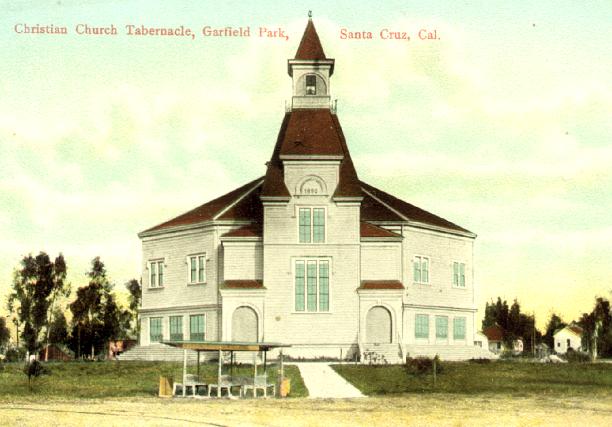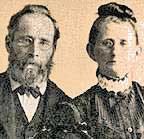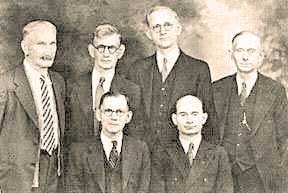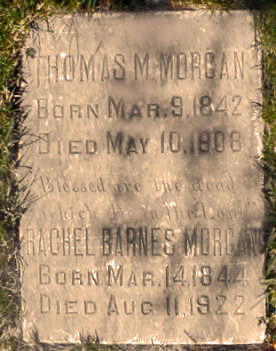Main Pioneer Menu | Profiles Index | Search Engine | PL
Pioneer Northwest Christians
By Charles Dailey Revision 2 - 2002
| Thomas M. Morgan at a Glance: | |
| Born: | Davis County, Missouri -- 1842 |
| Married: | Rachel Barnes -- 1867 |
| Moved: | Kansas |
| Emigrated: | To Oregon by rail in 1874 |
| Settled 1st: | Coquille, Oregon |
| Family: | See list |
| Ministries: | 1877 -- Coquille, Oregon (Circuit Riding)
1878 -- Drain, Oregon (Circuit Riding) 1880 -- Amity, Oregon (Circuit Riding) 1880 -- Perrydale (Circuit Riding) 1880 -- Springdale (Circuit Riding) 1880 -- Bethel (Circuit Riding) 1881 -- Chehalem (Circuit Riding) 1882 -- Eden Valley, WA 1886 -- Dayton, WA 1892 -- Hatton, WA 1892 -- Moscow, Idaho 1907 -- Paso Robles, CA |
| Settled: | South end of Adams County, WA |
| Buried: | Santa Cruz, California |
Sterling and Margaret (McDaniels) Morgan idolized their preacher in Missouri. To show their regard, they named their fifth son Thomas McBride Morgan in honor of Thomas Crawford McBride. McBride was a friend of John Mulkey and had been deeply influenced by the preaching and life of Barton Warren Stone in Kentucky. The year was 1842. Little did they know that both their preacher and their son would one day move beyond the borders of the United States to the far off land of Oregon. In fact, Thomas McBride would be on his horse riding west in just five more years.
There is a profile of T. C. McBride on this link.Thomas Crawford McBride's namesake, Thomas McBride Morgan, became a gospel preacher as he matured. Like many of his time, he both preached and farmed. The calling of the vocational preacher on the frontier would come in a few years, but for now, it was farm so one could feed the family and preach the gospel so we could enable others to know the Lord.
By 1867, Thomas M. Morgan had moved to Kansas and found that special lady that would be his bride for life. Rachel Barnes was born in Indiana, but when Thomas found her, she was living in Kansas. She was one of 18 children and so it is not surprising that Thomas and Rachel raised 11 of their own. Five children were born while they still lived in Kansas. The other six would be born in Oregon.
Thomas and Rachel There were reasons to leave farming in Kansas - like the grasshoppers that came by the millions. There were reasons to go to Oregon -- like Thomas had a brother that had moved to Coquille near Coos Bay, Oregon. So Thomas and Rachel decided to move to Oregon "where the climate was mild, there were big trees and wild berries in the woods and there were big red apples."
The year was 1874. Multitudes had already moved to Oregon to claim their one-square mile of land, but there were still opportunities left. The little family of seven with grandma Margaret sold their land and boarded an emigrant train - the kind that ran on rails. Another brother of Thomas also accompanied them.
They carried their beds and belongings. The passenger car just had plain benches with board backs for the long trip. The train ride ended in San Francisco, California. Following that, the family made their way to Coos Bay, Oregon by ship. To reach Coquille, they finished the trip on a sidewheel steam boat and then a skiff. Thomas McBride Morgan had reached the great northwest where he would preach and farm for most of his life.
Life was difficult for the Morgan family in Coos County. When a few acres were tilled, the grasshoppers did not come, but the fern grew faster than the wheat. Soon the family moved to Douglas County and lived at Lookingglass. This was 1878. Here they met another preacher and his struggling family - Abbot Levi Todd.
See the separate profile on A. L. Todd.Writing from his home in Lookingglass in 1879, Mr. Morgan gives an insight into the rigors of pioneer preaching:I have just returned from a visit in Coos County.After returning to Lookingglass, he made an effort to reach his regular appointment at Drain, but could not cross the Umpqua River. He then went to Camas Valley where a meeting was already underway with John Burris Smith and a Brother Johnson.On Tuesday evening I set out for Coquille City, and crossed the summit of the coast range through about two feet of snow and reached Coquille City on Thursday evening, and commenced meeting with Bro. Huntington Friday night, and continued until Wednesday night.
We had no additions to the church, but had a fine meeting and a pleasant time.
In Coquille City we have some noble souls. I shall ever feel grateful to them for their many kindnesses shown to me besides the many presents to myself and family . . . .
He wrote graphically:
The old members seem much encouraged at seeing their children and neighbors children bowing to the mandates of heaven. Cammas had become a wild place, but the interest in the cause of our Redeemer is kindling in the hearts of many, and especially of the young people. There are a number of noble young men and women in that vicinity, nine of whom confessed their faith in Jesus and were buried in the liquid grave. May the Lord bless the work.I want to go from Cammas to Canyonville and commence a protracted meeting, after which I expect to go to Drain and commence a revival meeting on Friday night before the 3rd Lord's day in March.
Dear brethren of Drain and Yoncalla brighten your swords, come up to the work with manly hearts, and let us work, for souls are at stake.
We have retained the spelling and punctuation of the original.
Thomas made his living by selling medicine through the countryside and preaching in school houses on Sundays. Historian Jerry Rushford says that he preached for churches at Amity, Pleasant Hill, Junction City, Roseburg and Cottage Grove. We must add Drain that that list.
Mr. Morgan wrote in the Pacific Christian Messenger about visiting his brother James, 15 years older than himself. This may have been in Linn County. His brother preached regularly and Tomas praised him.
Late in 1879, Thomas Morgan wrote that the family had been living on the farm of A. L. Todd and was moving to the Pleasant Hill area. They settled in the vicinity of Trent. Soon a report of a protracted meeting at Trent was published:
Bro. Morgan presents that zealous and earnest appearance which, I think, should be the characterize every preacher of the Gospel of our blessed Savior.In 1880 the family moved on to Bethel in Polk County where Thomas McBride Morgan preached to "several congregations of the Christian Church." Besides Bethel, the Amity, Spring Valley and Perrydale churches were nearby. Their son Andrew work as a janitor at Bethel, caring for the building that once housed Bethel College, but was now a school for the lower grades during the week and the meeting place for the Bethel Church on Sundays.
Their 17 year old daughter Ida took sick and died at Bethel. She is buried in the Bethel Cemetery, although no dates are given for birth or death on her marker.
Ida's name can be seen in the Bethel Cemetery listing.Jerry Rushford tells of Thomas M. Morgan riding to the cemetery where Thomas McBride was buried and of his disappointment that his grave was not marked with a stone. Today it has a fine stone placed by a group of visitors in 1998 who saw the need.
The marker can be seen on this link.T. M. Morgan received an invitation to preach at a camp meeting in Idaho during the summer of 1882. The money for the fare was sent, so the entire family moved to Eastern Washington. The trip begin at McCoy, just west of Bethel, as they boarded the train that would eventually take them to Walla Walla. (There were sections of the trip on boats, too.)
At Walla Walla, they were met by H. H. McClure from the Palouse country who moved them the rest of the way by wagon. They settled five miles from Palouse City and twelve miles from Colfax which had just been destroyed by a fire. That winter the snowdrifts reached twelve feet and the thermometer forty degrees below zero.
The sons of Thomas McBride Morgan:
Back: Andrew, Vernon, D. Loyd and Lester
Front: Simon and Charles
These men had a strong Christian
influence on early Adams County.Tom Morgan preached in this new community for a year and then became involved in planting a church in Dayton, Washington. During this time, his robust boys fenced the property and raised a garden.
Because of Rachel's failing health, the entire family moved near Dayton. This was 1886. A friend came to visit from Adams County and told of land that was available for the filing. T. M. immediately filed on some land - sight (and site) unseen. This 160 acres was about 12 miles south of present-day Lind, Washington.
Judy Sutherland Sitton, a family member writes:
In 1887 they moved to Adams County, 12 miles south of Lind, near sandhills. The Morgans were the first family in the area and had to go 5 miles for water until their well was dug. Many hardships came due to drought, squirrels eating the crops, and the blizzard of 1889-1890 that killed off most of the livestock.The farming operations began in earnest and as the boys matured, they gained their own land. Most of them settled in Adams County.
Mr. Morgan continued his circuit-riding preaching. He writes in the Christian Standard of 1890:
May 27 -- At my regular appointment at Deer Valley School-house, in Adams county, on the third Lord's day in this month, 1 lady made the good confession. Indications are good for more in the near future. The railroad trains failing to make connections at Colfax on my way to my regular appointments at Pleasant Flat, in Whitman county; I visited Eden Valley Church and received 2 by letter and 1 by confession and baptism.Delbert Loyd Morgan decided to follow in his father's footsteps of preaching the Gospel and attended the Eugene Bible University at Eugene, Oregon. He graduated in the class of 1909 and also from the University of Oregon. His first ministry was at Grangeville, Idaho. Then he moved to Clarkston, Washington to plant a church. From there he preached at Palouse, then moved to Albany, Oregon. He moved on to North Bend, then McMinnville in 1920. In California he held ministries in Vallejo, Marysville, Petaluma and Oakland.

D. L. Morgan
as a
young man.(The locations in the above paragraph are based on the records of Barbara Burke and Mr. Morgan's obituary. The photo is courtesy of James Albert Morgan.)
Tom and Rachel Morgan moved to Santa Cruz, California in 1903. It was an important Christian Church center at the time with the great Santa Cruz Tabernacle located there. It was also a health resort and they may have moved because their son, William Woodford Morgan was living there.
Rachel's health caused them to relocate, at least for a while, to Paso Robles where T. M. became the minister of the Christian Church. They returned to their home in Santa Cruz a few months before he died of a gastro-intestinal disorder. They lived in the vicinity of the Santa Cruz Tabernacle. Their son William died the year following his father's death.
There is a photo of the Santa Cruz Tabernacle.They finished out their lives and were buried in Oakwood Memorial Park near Santa Cruz. Their son, William Woodford Morgan is buried next to them. The spring trees were casting their shadows across the marker the day we photographed it.
THOMAS M. MORGAN
BORN MAR. 9, 1842
DIED MAY 10, 1908
"Blessed are the dead
which die in the Lord"
RACHEL BARNES MORGAN
BORN MAR. 14, 1844
DIED AUG 11, 1922
While Thomas McBride Morgan did not live to see his son D. Loyd begin his preaching career, he must have been proud of his goals. Rachel lived another 14 years.Charles Dailey 1999
Northwest College of the Bible
Sterling Morgan (1799-) & Margaret McDanields (-1879) | Thomas McBride Morgan (1842-1908) & Rachel Barnes (1844-) | | Ida Rosaline Morgan (1865-) | | Mary Morgan (1867-) | | Andrew Morgan (1869-1961) & Maybelle May (1880-1974) | | | Zona Morgan & Frank Connell | | | | Lloyd | | | | Keith | | | Dessie Morgan & D. Irvin Berry | | | | Dan Berry | | | | Larance Berry | | | | Franklin Berry | | | Eva Morgan | | | Florence Morgan & McDougall | | | Gladys Morgan & William Sutherland | | | | Dean Sutherland | | | | Kenneth Sutherland | | | | Patricia Sutherland | | | | Joan Sutherland | | Albert Morgan (1871-1906) | | William Woodford Morgan (1872-1909) | | Charles Morgan & Lena | | Simon Morgan & Minnie Elizabeth Campbell | | | Lora Pearl (1904-1904) | | Lester Morgan | | Delbert Loyd Morgan & Lora | | Vernon (Vernie) Morgan & Laura | | Vista Morgan
Main Pioneer Menu | Profiles Index | Search Engine



